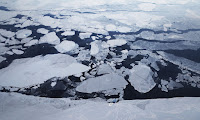A new UN Environment report on the Arctic was released last week, which covered a broad range of changes to the region’s climate, environment, wildlife, and epidemiology.
The accompanying press release focused on the report’s section about climate change. It warned that, “even if the Paris Agreement goals are met, Arctic winter temperatures will increase 3-5C by 2050 compared to 1986-2005 levels” and will warm 5-9C by 2080.
The report was covered by a number of news outlets, including the Guardian, Wired, Hill, CBC, and others. Media coverage focused on the idea – promoted in the press release – that large amounts of Arctic warming is “locked in”, “inevitable”, or “unavoidable”.
However, an investigation by Carbon Brief has found that the section of the report on climate change erroneously conflates the Paris Agreement target – which is to limit warming to “well below” 2C by the end of the century relative to pre-industrial levels – with a scenario that has much more modest emission reductions which result in around 3C of global warming.
In climate-model runs using a scenario limiting global warming to below 2C, the Arctic still warms faster than the rest of the world. But future Arctic winter warming will be around 0.5-5C by the 2080s compared to 1986-2005 levels, much lower than the 5-9C values stated in the report.
This means that much of the future warming in the Arctic will depend on our emissions over the 21st century, rather than being “locked in”, as the report claims.
Read more at Is 3-5C of Arctic Warming Now ‘Locked In’?

No comments:
Post a Comment